You cant get there from here : the past as present in small-town Ontario fiction / Ryan Porter.
Includes bibliographical references and index.
1. Canadian fiction (English) 20th century History and criticism. 2. Canadian fiction (English) 21st century History and criticism. 3. Small cities In literature. 4. Ontario In literature. I. Title. II. Title: You cannot get there from here.
University of Toronto Press acknowledges the financial assistance to its publishing program of the Canada Council for the Arts and the Ontario Arts Council, an agency of the Government of Ontario.
Acknowledgments
This book has been a long time in the making, far longer than I would have imagined at the beginning of the process. It is difficult to summarize and acknowledge all of the people who, over the years, have influenced the project directly or indirectly. If Ive left someone out, it is an oversight, one that I hope to correct in person at some point in the future.
I would like to thank the incredibly helpful, supportive, kind, and professional people at the University of Toronto Press. Thanks, first, to Mark Thompson for guiding the manuscript through the many rounds of reviews and approvals. Mark offered encouragement and exceptionally helpful advice when it mattered most, and I am very grateful to him. Barbara Tessman provided insightful and incisive edits, which resulted in a much improved manuscript. Thanks to Frances Mundy for shepherding the manuscript through the latter stages of the process, and also to Breanna Muir for her expert advice and suggestions.
I would also like to thank Siobhan McMenemy whose comments early in this process had a lasting impact on the book. Thank you, Siobhan.
Tracy Ware at Queens University supervised an earlier version of this project. At many points while writing this book I would question my judgement. At those moments, I would simply ask myself: what might Tracy suggest? The answers to that question helped guide the rhetorical and analytical aspects of the book. Thank you, Tracy. You are a personal and professional exemplar to people in this field. Thanks to Leslie Monkman who offered his insight and expertise during an earlier version of this project. And while I havent been a student at Queens for nearly a decade now, I do want to thank all of the faculty members who helped, taught, or employed me during my time as a student there. Thank you, also, to Gerald Lynch at the University of Ottawa for his kind interest and generous advice over the years.
My sincere thanks go to the people at Studies in Canadian Literature. A version of appeared in that journal in 2011, and they have graciously allowed publication of that material in this book.
Thank you to the anonymous peer reviewers of the book manuscript. Your critical insight and expertise improved this project significantly.
Thank you to Paul Barrett for his astute suggestions at many stages of this project. Thank you, also, to my many other friends who listened politely as I rambled on about this topic through the years, but more importantly, for all of the laughs that weve shared.
Thank you to my colleagues and friends at Algonquin College. I am fortunate to get to work with such kind, professional, generous people every day.
Special thanks to my mother, Kathryn, for sharing her love of Canadian literature with me many years ago. My entire family - Rob, Emily, Reg, Genie, Salim, Louise, and Aneessa - thank you everyone for your words of support through the years.
Most of all, I would like to thank Kareen, Georgia, and Rosie. Georgia and Rosie, you have been the source of so much joy and happiness during the years that you have influenced this book in ways that I cant even begin to realize. Kareen, your encouragement, advice, love, and support have influenced this book more than anything else. For all of this, and for our many years together, I humbly dedicate it to you and our daughters.
YOU CANT GET THERE FROM HERE
The Past as Present in Small-Town Ontario Fiction
Introduction
Projecting Difference The Heritage of Small-Town and Rural Ontario
The small-town setting is an undeniably common feature in Canadian and specifically Ontarian literature. It has also become emblematic of a tired, outdated literary canon. For some Canadian literary critics, the mention of the small town evokes a national experience rooted in the past, while for others it symptomizes a national atavism, a blinkered anti-cosmopolitanism. The small town has also been read as representative of an amiable cultural identity, a window into a past that fuels misguided notions of national benevolence and goodwill. However, none of these interpretive pathways provides much understanding about what these fictional towns really offer. Furthermore, the proliferation, variety, and regional distinction of small-town narratives demand that they not be dismissed as indicators of colonial anxiety, parochialism, or a fixation on the past. Far from simply offering nostalgic visions of a better bygone era or outmoded representations of archaic national experience, small-town narratives offer complex depictions of the imagined divide separating rural and urban experience, and of how the past is shaped to respond to the needs of the present.
Nostalgia is a complex and ambivalent yearning, and, in small-town Ontario literature at least, rarely does it produce portraits that revel in the idyll; if it did, the literature would be easy to categorize, and perhaps discount, as part of a simple pastoral tradition. This book argues that Ontarios small-town literature rarely reflects the simple pastoral or unreflectively imagines the rural and small-town past as a place of peace and simplicity. Rather, Ontarios literary small towns are reflections, and even sublimated explorations, of contemporary life. Over the past century, the emergence of Ontarios small-town literature has paralleled the transition of Ontario from a province largely characterized by its rural and small-town settlements to an urban province dominated by its industrial, cultural, and administrative centres. Yet the literary towns that have emerged during this time certainly reveal a past that offers a contrast to the present in which they are written, and also indirectly comment on the evolving, unfamiliar present. The literature of small-town Ontario functions not as documents of a receding past or lost golden age, but as sophisticated statements on the effects of modernity and on the vexed position of the rural and local in an increasingly cosmopolitan world.

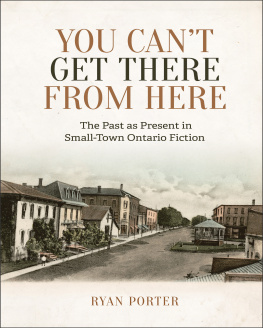
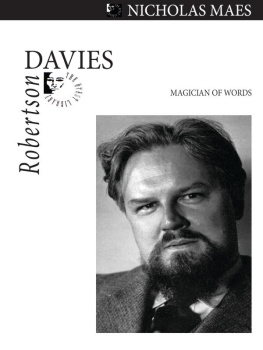

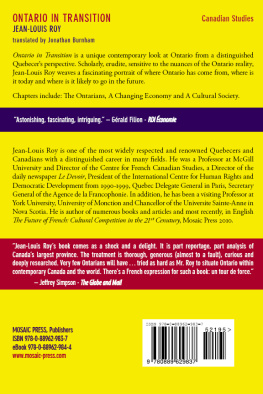
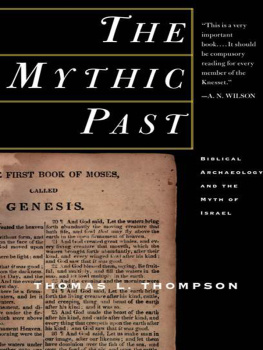
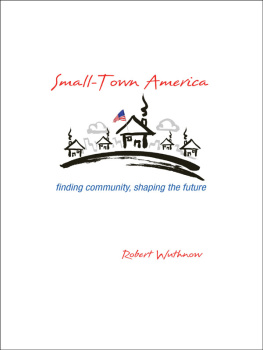

 Printed on acid-free, 100% post-consumer recycled paper with vegetable-based inks.
Printed on acid-free, 100% post-consumer recycled paper with vegetable-based inks.